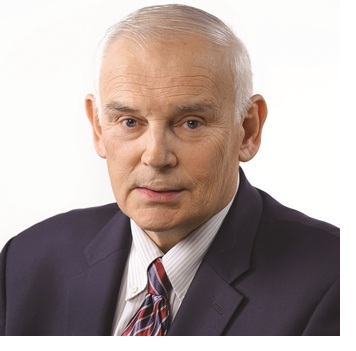The new campus building of Northwestern University in Qatar (NU-Q), situated at the Education City is arguably the largest and most technologically advanced media school in the world. It combines contemporary design with its cutting-edge technology in an environmentally-friendly facility, says Everette E Dennis, Dean and CEO of NU-Q.
The campus was designed by distinguished American architect Antoine Predock. Predock travelled around the world, deriving inspiration from ‘desert structures’ to give NU-Q’s new building a look and feel appropriate to Qatar’s culture, climate, and location.
NU-Q is a journalism and communication school, and one of six American branch campuses operating in Qatar Foundation’s Education City.
More than 240 students and faculty recently began their winter semester at this new building.
Speaking to The Peninsula’s Doha Today, Everette E Dennis shared the uniqueness of the new building, academic and research programmes being offered at the campus and its contribution to the society.

What types of programmes you offer at NU-Q, and any plans to introduce new programmes/courses in the near future?
NU-Q is a modern media and communication school, with a diverse student body of 248, representing 32 different nationalities. The branch campus was established in partnership with Qatar Foundation in 2008 to offer two undergraduate programmes in communication and journalism, with a foundation in the liberal arts.
Founded in 2008 in partnership with Qatar Foundation, NU-Q provides its students the opportunity to explore the world and, ultimately, shape its future through its distinguished schools of communication, journalism, and liberal arts.
NU-Q was established by visionary leaders at Qatar Foundation and Northwestern University in Evanston, who recognised the need for a state-of-the-art media school in the region. Since its founding, it has been recognised for its exceptional educational offerings, facilities, and high calibre students. Our faculty members come from academia and industry and bring with them a wealth of theoretical and practical knowledge.
We offer a variety of courses in media, communication, and liberal arts. We also offer many opportunities for students to engage in research projects, service learning trips, exchange programmes, internships, residencies, and first-hand meetings with industry professionals.
In the near future, we are working on developing a master’s programme, as well as community courses within the field. Our home campus in Evanston, Illinois has recently been ranked as number 12 in the United States by US News and World Report and in the top 20 universities worldwide by the Times Higher Education World University Rankings.
Are there any plans to introduce graduate programmes?
Yes –we are considering a master’s in media industries and, in collaboration with HBKU, a master’s in health communication. Also, a master’s in sports media management and communication is being designed and proposed in collaboration with our home campus in the United States.
How many NU-Q graduates are there to date?
Since our establishment in 2008, we have graduated five classes and now have more than 200 alumni who are excelling in the local media outlets including, Al Jazeera English and Arabic, Al Arabiya, beIN Sports, The Film House, Qatar Foundation and Weber Shandwick. Many serve in communication roles within all manners of organisations, including sports. Meanwhile, close to 35 percent of our alumni are pursuing graduate studies in top graduate schools including Harvard University, London School of Economics, McGill University, Northwestern, Cambridge, and Oxford.
What is the ratio between Qatari and non-Qatari students?
Nearly half of our student body is Qatari; the remaining students come from more than 30 other nationalities.
Provide us with an insight on the research taking place at NU-Q? What areas are being researched and what does research mean to NU-Q?
Faculty and students at NU-Q engage in pioneering research about the news and media industries in the MENA countries; media use among of women and young audiences, media effects on national identity, journalistic practices, mobile media, digital literacy and more. Building on the research tradition of the Northwestern University home campus in the United States, which is one of America’s leading private research universities, our research topics include Middle East media, communication, gender, youth media, media and democracy, and other topics.
Each year, Northwestern University in Qatar conducts an annual region-wide survey of media use patterns, content preferences, and attitudes toward issues such as censorship, freedom of speech, and cultural preservation. This is part of the World Internet Project. Last year, also published a wide-ranging study of media industries in the MENA region including film, television, music, digital media, newspapers, advertising, and more.
Our students have not only been involved in numerous faculty studies but have increasingly become interested in pursuing research projects of their own, mentored by our faculty.
Do you train your students in Qatari media outlets?
Our students are encouraged to take on internships while studying to gain a better understanding of the career prospects available to them. Our journalism and strategic communications students are also required to complete a residency program during their third year in media companies around the globe. Our students have worked with USA Today, Huffington Post, Film House, Resolution Films, Ginger Camel Blue Rubicon, Euronews, Al Jazeera Stream, Grayling and many other esteemed organizations.
How unique is NU-Q’s new building and the types of facilities it includes.
The building, designed by the internationally renowned architect, Antoine Predock, is arguably the largest and most technologically advanced media school in the world. It combines contemporary design with its cutting-edge technology in an environmentally-friendly facility.
The structure, which is more than 500,000 square feet, is inspired by the region’s desert landscape and embodies subtle elements that express Qatari culture, climate, and location. It was recently awarded a LEED Gold certification, which is a mark of quality and achievement in environmentally-friendly construction.
Features of the building include, three video production studios, two 150-person lecture halls, world-class multimedia newsroom, two-story research library, in-house digital museum, the Media Majlis at NU-Q, Black Box theater, multiple control rooms, multiple editing rooms, an auditorium, a large outdoor LED screen, Saif Tip and a three-story media hall.




